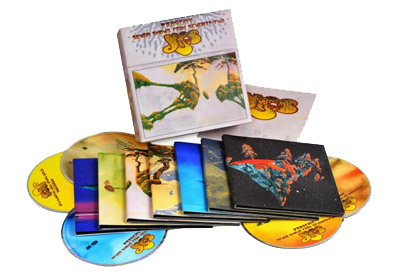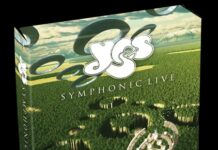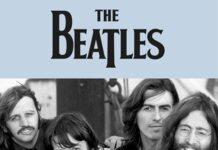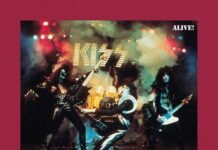When it comes to the golden age of progressive rock, 1972 is arguably one of its most poignant and evolutionary years. There was Jethro Tull pushing the conceptual boundaries with Thick As A Brick. Emerson, Lake & Palmer dazzled the ear drums with their third and most accessible album, Trilogy. And Yes broke the Top 20 with “Roundabout.” After Yes completed Close To The Edge, drummer Bill Bruford left to join King Crimson and Alan White was hastened in that summer as a replacement for the forthcoming tour. In 1973, Yessongs, a film and record that documented the Close To The Edge tour, gave everyone a glimpse of how powerful Yes was in concert. Over 40 years later, Progeny: Seven Shows From Seventy-Two, a 14-disc set of seven shows from October 31 through November 20, reaffirms the band’s muscle and might in 1972.
On the surface, it’s only too easy to compare these seven two-CD sets (a double disc Highlights version is also available) to Yessongs without “Long Distance Runaround,” “The Fish” and “Starship Trooper.” Many of the songs recorded here were, in fact, intended for Yessongs, but for whatever reason, the tapes were put away, left undisturbed until engineers combing for “bonus tracks” for Yes remasters rediscovered the long-forgotten recordings (there could be more, but no one’s talking). For Yes fans, with 1972 being such a pivotal year and Close To The Edge as one of the most cherished albums in the Yes catalog (it even got the Blu-ray surround sound treatment from Steven Wilson), it’s no surprise to hear the phrase “holy grail” bandied about in conversations regarding the content of Progeny.
As they did throughout the Close To The Edge tour, the grand opening comprising an orchestral recording of Igor Stravinsky’s “Firebird Suite” precedes “Siberian Khatru.” At once, you notice a rawer, in some cases fuller, sound on these CDs. Clearly, modern technology was used to ring out Rick Wakeman’s incalculable keyboards and Steve Howe’s embryonic guitar — the most integral ingredients of the Yes canon at this time. They, of course, get to stretch even further when Howe flutters his fingers on his acoustic for “Mood For A Day” and “Clap,” and Wakeman takes the spotlight with excerpts from his solo album, The Six Wives Of Henry The VIII.
Vocally, singer Jon Anderson is at his absolute best, tunefully and harmonically wise. His repartee with the audience is uncut and more revealing of how intimate and gracious he was, despite the heavy-handed headiness of the music. “It really is nice to be here,” he announces before a song. “Beautiful building. It looks like a big mushroom.” he says before introducing an enticing “Close To The Edge” to the crowd on November 15 at the Knoxville Civic Auditorium in Knoxville, Tennessee. Whatever high Anderson was on in 1972, it all seemed to have worked out.
Narrowing down standouts is nearly impossible when the setlist is 99% identical and the arrangements are pretty much by the numbers. You still hear small deviations from the script on playback of any of the seven. “Roundabout,” for example, takes exceptional flight on the November 11, Duke University show as the mix of Wakeman’s keys drives the song, at least early on, before Howe’s guitar takes front and center. If you were to go back to another show, you might hear the same thing but in a manner that isn’t so apparent. A member of the band for four months at the time of these shows, Alan White is seemingly embedded comfortably into the realm of Yes music, as his drumming on versions of “Heart Of The Sunrise,” for example, keep the train running smoothly and on schedule while Wakeman’s Hammond foams up underneath, Howe runs up and down the neck, and bassist Chris Squire rows the rhythm with Herculean precision. The chemistry of Yes was like a well-oiled, geared-up machine in 1972.
In addition to the music, there are seven different Roger Dean designs for each two-disc set, plus a booklet with a thorough and prodigious essay by Syd Schwartz, along with Producer’s Technical Notes from Brian Kehew, who mixed and co-produced the set with Steve Woolard, describing the challenges and technical issues with the 12 hours of tape. He points out how Squire’s bass had to be tinkered with and EQ’d in the mix. He also mentions how Wakeman’s keyboards were problematic back in those days, at one point intercepting a radio station, which ominously leaks through during the October 31 show in Toronto. Thanks to today’s technology, they were able to transform these old recordings into sonic wunderkinds that defy time and space. If you really want to understand what made progressive rock so progressive back in 1972, you need to dig deep and take Progeny: Seven Shows From Seventy-Two home for a spin. It’s an extended lesson in musical pretentiousness without the pretense.
~ Shawn Perry




















